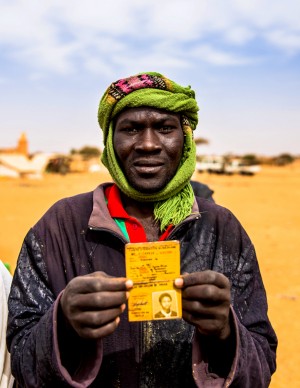UNHCR and the African Development Bank call for solidarity with forcibly displaced populations in Africa
The Bank organized a two-day forum in Abidjan to explore, among other issues, how to better support countries affected by displacements of populations.
ABIDJAN, CÔTE D’IVOIRE, 12 January 2017 (UNHCR) – The UN Refugee Agency has called for greater solidarity with forcibly displaced populations in Africa and their inclusion in the funding streams of the African Development Bank (AfDB) and its affiliates. UNHCR Africa Bureau Director Mr. Valentin Tapsoba made the call this week during a two-day Africa Resilience Forum held in Abidjan, the capital of Côte d’Ivoire. The Forum was organized by the AfDB to discuss how best to support countries categorized as “fragile”, including many affected by large-scale forced displacement.
“In addition to solidarity, political, material and financial support for humanitarian responses in Africa,” Mr. Tapsoba appealed. “The AfDB and its member states should facilitate the inclusion of displaced populations into existing and new funding opportunities to move from humanitarian assistance towards durable development.”
Of the 65.3 million forcibly displaced people worldwide, 19.5 million (29%) live in Africa across 18 countries and territories. They face a wide range of challenges, including serious human rights violations, loss of socio-economic activities and damage to property, such as houses, land and social infrastructures, not to mention the loss of social linkages with their communities. The number of refugees and internally displaced persons (IDPs) who returned home in 2016 was low. Worldwide, 200,000 persons were assisted to go home, while in Africa, UNHCR facilitated the repatriation of some 80,000 persons, comprising Ivoirians, Somalis and Malians.
“The majority of those who have returned to their countries in Africa are going back to fragile situations that are unsustainable without greater public and private investment,” Mr. Tapsoba explained. “Sustainable returns should be linked to self-sufficiency and support so that returnees are able to learn new skills, educate their children, access adequate health care and participate in the economy,” he said. Improved conditions are key to ensuring the durable return desired by many of those living in exile or internally displaced.
For returns to continue, the Director asked the AfDB and partners to join forces together with refugees and IDPs to secure their future and reduce displacement. The AfDB has previously supported UNHCR to respond to the Ivorian crisis in 2011 and to support livelihoods in the countries of the Mano River (Liberia, Cote d’Ivoire, Guinea and Sierra Leone) in 2010.
“Refugees, like other people, have skills and assets and must not be considered a burden to states” said the Regional Representative for West Africa, Liz Ahua, at the side event UNHCR presided. Ms. Ahua also stressed that refugees can play a positive economic role in host countries. She encouraged receiving countries to tap into their energies, skills and knowledge that refugees bring to build their temporary lives and homes while in exile.
The side event was entitled ‘Solutions to Refugees and Internal Displacement in Africa’. It focused on examining opportunities and challenges. Other speakers on the panel included representatives from NGOs, AfDB, host government ministers and WFP. Other participants included UN Agencies, academics, ambassadors, journalists and representatives from the private sector.
For any further information please contact: In Abidjan – Mohamed Touré (Representative) Tel: +225 44064848; In Dakar – Simplice Kpandji: Tel: +221 773339883; David Nthengwe, Tel: +221 777 406063



















